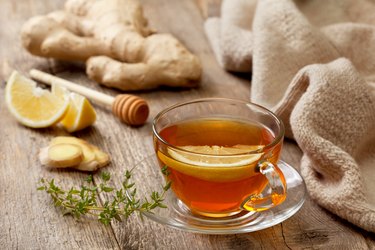
When colder weather rolls around, it's not uncommon to find yourself reaching for the tissue box and teapot more often. Especially if you're dealing with a cold or flu, a hot cup of tea is a great way to keep yourself hydrated and may even help relieve some common symptoms.
But you'll want to choose the best tea for your ailment. Opt for ginger, eucalyptus or peppermint options to help relieve symptoms like nausea, coughing and sore throat and try to avoid caffeinated teas. Be sure to consult your doctor if your symptoms persist, if they're severe or if you develop a fever, according to the Mayo Clinic.
Video of the Day
Video of the Day
Read more: 5 Uncommon Ways to Fend Off Cold and Flu
Ginger Tea for Nausea
Ginger tea is a spicy, aromatic tea made from fresh or dried ginger root. While there's no firm evidence that ginger can certainly cure any ailment, it can be used to alleviate cold and flu symptoms like inflammation, motion sickness and nausea, according to Harvard Health Publishing.
Typically, if you're sick with the cold or flu, your body will experience some inflammation, according to the Mayo Clinic. And ginger tea, specifically, is linked to anti-inflammatory properties, according to an April 2013 study published in the International Journal of Preventative Medicine.
If you're experiencing vomiting or nausea, ginger tea is among the best herbal options. The active ingredients in ginger, like gingerols and shogaols, may help treat nausea and vomiting and have been frequently tested in the context of pregnancy or chemotherapy, according to a March 2016 article published in Integrative Medicine Insights.
Eucalyptus Tea for Coughing
The leaves of the eucalyptus plant, an herb native to Australia, may help relieve cold and flu symptoms. Eucalyptus contains an essential oil called cineole, which is commonly used as a fragrance or flavoring agent in cough drops and medicines, according to the National Institutes of Health.
Not only is cineole an enjoyable flavor but it may be helpful if you're struggling with a cold. The anti-inflammatory properties of the oil may help alleviate the respiratory system, which can get irritated when you're sick. In fact, cineole has been shown to help treat acute bronchitis symptoms by reducing cough frequency after just four days, according to a November 2013 study published in Cough.
Peppermint Tea for Sore Throat
If you've ever rubbed some Vicks on your chest to relieve your sinuses, you're probably familiar with the peppermint aroma. Peppermint has anti-inflammatory properties and may help relieve congestion and clogged sinuses.
Although studies on peppermint's efficacy are limited, the tea may have some pain-killing properties. If you're experiencing a sore throat, peppermint tea may help numb the throat and alleviate the pain, according to the University of Pennsylvania Medicine. Peppermint is also naturally non-caffeinated, which means it won't affect your sleep as your body recuperates.
Read more: Can Sugar Worsen a Cold?
- Harvard Health Publishing: "Can Everyday Spices Make You Healthier?"
- Mayo Clinic: "Common Cold"
- International Journal of Preventative Medicine: "Anti-Oxidative and Anti-Inflammatory Effects of Ginger in Health and Physical Activity: Review of Current Evidence"
- Integrative Medicine Insights: "The Effectiveness of Ginger in the Prevention of Nausea and Vomiting during Pregnancy and Chemotherapy"
- National Institutes of Health: "Cineole"
- Cough: "Efficacy of Cineole in Patients Suffering From Acute Bronchitis: a Placebo-Controlled Double-Blind Trial."
- University of Pennsylvania Medicine: "6 At-Home Remedies to Ease Your Sore Throat"